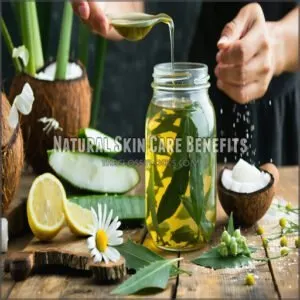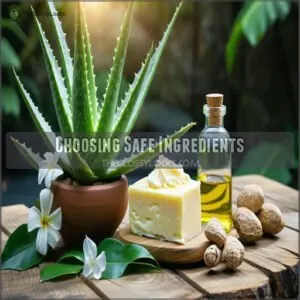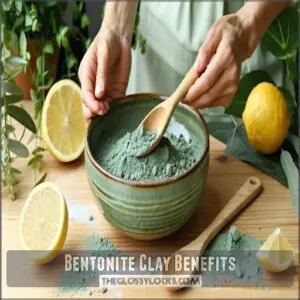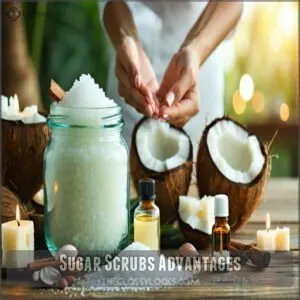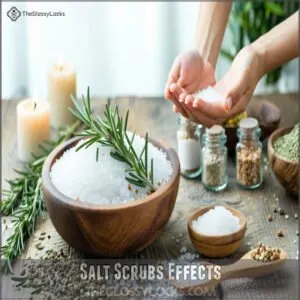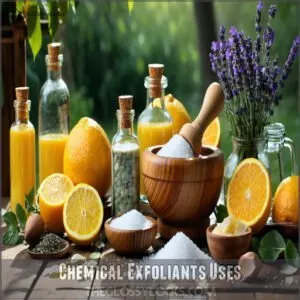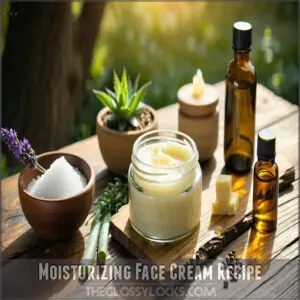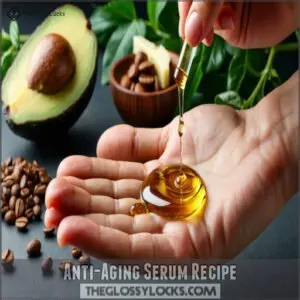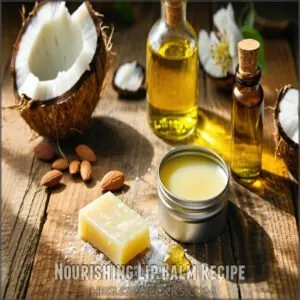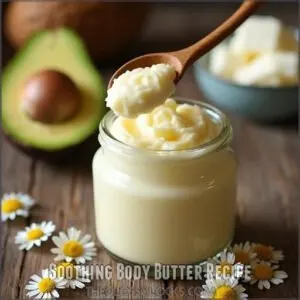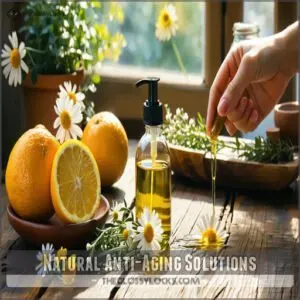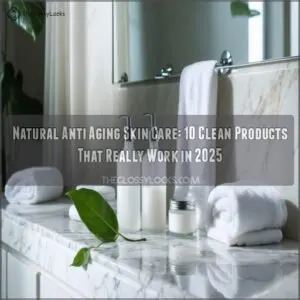This site is supported by our readers. We may earn a commission, at no cost to you, if you purchase through links.
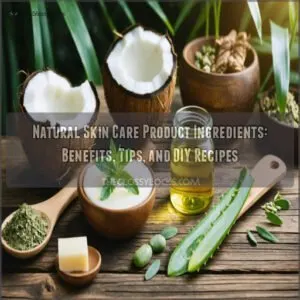
Coconut oil and shea butter moisturize deeply, while aloe vera soothes and heals.
Looking for a glow? Green tea is rich in antioxidants to protect your skin from damage, and centella asiatica works wonders on hydration and regeneration.
For exfoliation, sugar and salt scrubs gently remove dead skin, while bentonite clay pulls out impurities.
Want natural anti-aging perks? Try vitamin C for brightening and collagen support or rose distillate for a calming, youthful boost.
Treat your skin to these gems—it deserves the best. Curious? There’s more to explore, with natural skin care being a great place to start, and don’t forget coconut oil.
Table Of Contents
- Key Takeaways
- Natural Skin Care Benefits
- Choosing Safe Ingredients
- Natural Exfoliants Options
- DIY Skincare Recipes
- Natural Anti-Aging Solutions
- Frequently Asked Questions (FAQs)
- What is the best natural ingredient for skincare?
- What do natural ingredients mean in skincare?
- What are naturally sourced ingredients?
- What does 100% natural mean in skincare?
- How can I identify high-quality natural ingredients?
- What are the best preservatives for DIY skincare?
- Are cold-pressed oils better for skin care?
- How do I safely store homemade products?
- Can I combine different essential oils safely?
- Conclusion
Key Takeaways
- You can hydrate your skin with natural moisturizers like coconut oil and shea butter, which deeply nourish and soothe.
- For anti-aging, try vitamin C to boost collagen or rose distillate to calm skin and promote a youthful glow.
- Use natural exfoliants like sugar scrubs or bentonite clay to gently remove dead skin and detoxify impurities.
- Protect and heal your skin with ingredients like green tea for antioxidants or aloe vera for soothing and hydration.
Natural Skin Care Benefits
You’ll find that natural ingredients like coconut oil and green tea aren’t just trendy—they offer real benefits like hydration, healing, and protection.
These plant-based options can soothe sensitive skin, combat aging, and even reduce inflammation, all while being kind to the environment.
Coconut Oil Benefits
Coconut oil is a powerhouse among natural skin care ingredients.
It boosts skin hydration, acts as a natural moisturizer, and supports skin regeneration. Its anti-inflammatory properties soothe irritated skin, making it a go-to for dry patches.
Beyond skincare, it’s excellent for oil pulling and hair care.
Plus, it’s a dreamy lip moisturizer—say goodbye to chapped lips!
Centella Asiatica Benefits
Centella asiatica, often called a miracle herb in herbal remedies, works wonders for skin.
Known for its anti-inflammatory properties and wound healing abilities, it promotes skin regeneration and hydration.
This powerhouse ingredient strengthens the skin barrier while speeding up recovery, making Centella skin products a staple in natural skin care and herbal anti-aging solutions!
Green Tea Benefits
Green tea is a powerhouse for your skin.
Packed with antioxidants, it helps protect against sun damage while promoting a youthful glow.
Its anti-inflammatory effects soothe redness and irritation, making it a favorite in the natural skincare ingredients list.
The photoprotection benefits of green tea extract also add an extra layer of skin protection, perfect for daily self-care rituals.
Green tea’s numerous benefits can be attributed to its antioxidant properties, which play a significant role in maintaining healthy skin.
Colloidal Oatmeal Benefits
When your skin’s itching or inflamed, colloidal oatmeal feels like a warm hug.
Packed with beta glucans and starches, it hydrates and soothes. This natural skin care ingredient works wonders for eczema relief and other irritations.
Here’s why you’ll love oatmeal skin care:
- Soothes Itch Relief
- Minimizes Allergies
- Calms Rashes
- Hydrates Deeply
- Safe for Sensitive Skin
Choosing Safe Ingredients
When choosing skincare ingredients, it’s important to focus on what’s safe and effective for your skin type.
Avoid harsh chemicals and look for natural options like aloe vera, shea butter, or argan oil, which offer proven benefits without unnecessary risks.
Aloe Vera Properties
Aloe vera benefits are plenty—it’s like nature’s first-aid kit for your skin.
Whether you need skin healing, wound care, or anti-aging support, aloe gel delivers. Its soothing touch makes it a favorite in natural skin care ingredients.
For more detailed information, explore the numerous aloe vera skin benefits.
Check out this quick guide:
| Benefit | Effect | Use | Fun Fact |
|---|---|---|---|
| Skin Healing | Repairs minor burns | Aloe gel | Cleopatra loved it! |
| Wound Care | Speeds recovery | Apply on cuts | Used in ancient medicine |
| Anti-Aging Support | Reduces wrinkles | In organic skincare | Packed with antioxidants |
| Hydration | Lock in moisture | Skincare products | Light texture, heavy results! |
Shea Butter Effects
Shea butter is a superstar in natural skin care ingredients, delivering intense skin hydration and moisture retention.
Its anti-inflammatory properties soothe irritation, while aiding skin regeneration for a smoother, healthier look.
Perfect for organic skincare, it works wonders on sensitive or dry skin, and Shea Butter Benefits make it a natural favorite—gentle yet deeply nourishing for any skin care routine!
Argan Oil Advantages
Packed with antioxidants, argan oil is a powerhouse among natural skincare ingredients.
It enhances skin hydration while helping regulate oil for a balanced, healthy complexion.
Its anti-inflammatory properties soothe irritation, benefiting sensitive skin.
Plus, its antiaging perks support elasticity and reduce fine lines.
Bonus? It’s great for hair care too—use it to tame frizz and boost shine!
Apple Cider Vinegar Uses
A staple in your kitchen cabinet, apple cider vinegar doubles as a powerful natural skin care ingredient.
You’ll find it’s an excellent skin toner that helps balance your skin’s pH levels while acting as a natural cleanser.
When diluted properly, it’s effective for acne treatment and can unclog pores.
For best results, mix one part vinegar with three parts water to create a gentle yet effective solution.
Natural Exfoliants Options
You’ll find that nature provides excellent options for removing dead skin cells, from gentle sugar scrubs to powerful clay masks that work wonders on your complexion.
Whether you’re dealing with rough patches or just want to brighten up your skin, these natural exfoliants will help you achieve that healthy glow without harsh chemicals.
Bentonite Clay Benefits
Among natural skincare ingredients, bentonite clay stands out as a powerful detox powerhouse.
When mixed with water, this mineral-rich clay transforms into a potent skin purification treatment that works wonders for your complexion.
- Clay therapy draws out impurities and excess oils from deep within pores
- Mineral absorption helps nourish and rejuvenate tired skin
- Toxin removal capabilities make it perfect for weekly detox masks
- Bentonite clay benefits include reducing acne and evening skin tone
The numerous bentonite clay health benefits have made it a staple in many natural skincare routines, providing a natural detox solution.
Sugar Scrubs Advantages
Sugar scrubs serve as gentle physical exfoliants that naturally buff away dead skin cells while moisturizing your skin.
You’ll love how these natural skincare ingredients promote cell renewal without harsh chemicals.
The fine granules provide effective skin smoothing, making it an ideal natural exfoliator for sensitive areas.
When mixed with nourishing oils, sugar’s natural humectant properties help lock in moisture, leaving your skin silky-smooth and refreshed.
Salt Scrubs Effects
Salt scrubs, nature’s gentle powerhouse, offer a natural way to detox and rejuvenate your skin.
When you’re looking for mineral-rich exfoliants, sea salt delivers impressive results.
Here’s what salt scrubs can do for you:
- Gently removes dead skin cells while preserving skin’s natural barrier
- Infuses skin with essential minerals like magnesium and calcium
- Improves circulation through gentle massage action
- Helps purify pores for a deeper skin detox
- Creates smoother, more radiant skin texture
This natural process can lead to improved skin health, making salt scrubs a valuable part of any skincare routine, providing a natural way to achieve healthier skin.
Chemical Exfoliants Uses
While physical scrubs work their magic from the outside, chemical exfoliants like Alpha Hydroxy Acids (AHAs) and Beta Hydroxy Acids (BHAs) gently dissolve dead skin cells from within.
AHAs, including glycolic and lactic acid, brighten your complexion and tackle mild discoloration.
If you’re battling oily or acne-prone skin, Beta Hydroxy Acids (BHAs) like salicylic acid are your best friend, diving deep into pores to clear out stubborn sebum.
Understanding chemical exfoliation basics is key to effectively incorporating these ingredients into your skincare routine with the help of chemical exfoliants.
DIY Skincare Recipes
You’ll find it’s surprisingly easy to create your own skincare products using natural ingredients like shea butter, aloe vera, and essential oils right in your kitchen.
With these simple recipes, you can make everything from moisturizing face creams to soothing body butters while knowing exactly what goes into your skincare routine.
Moisturizing Face Cream Recipe
Creating a nourishing face cream at home lets you control exactly what goes onto your skin.
Mix shea butter, aloe vera gel, and jojoba oil for deep hydration, then add lavender essential oil for a calming scent.
Your custom moisturizer will feel luxurious and cost less than store-bought options.
Using a natural face cream product can provide numerous benefits for your skin.
- Start with a clean, sterilized glass jar to prevent contamination
- Melt ingredients using a double boiler method for even consistency
- Add vitamin E oil as a natural preservative to extend shelf life
- Store in a cool, dark place to maintain freshness
- Test a small amount on your inner arm before applying to face
Anti-Aging Serum Recipe
Now that you’ve mastered moisturizing basics, let’s craft a powerful anti-aging serum.
You’ll need your favorite carrier oil (fractionated coconut, avocado, grapeseed, argan, or jojoba) as your base.
Mix in vitamin E oil for natural preservation, then add skin-loving essential oils.
This natural serum promotes skin regeneration while botanical extracts and antioxidants fight aging signs.
For best results, apply nightly after your facial toner.
Nourishing Lip Balm Recipe
Now that you’ve learned about serums, let’s explore making your own nourishing lip balm using natural skincare ingredients.
You’ll love how beeswax creates a protective barrier while coconut oil deeply moisturizes your lips. Mix these natural moisturizers with sweet almond oil for a luxurious homemade recipe that beats store-bought options.
Using a natural lip balm product can help you understand the importance of natural ingredients in skincare.
- Combine 2 tablespoons beeswax with 1 tablespoon coconut oil for the perfect consistency
- Add 5 drops vitamin E oil to preserve freshness
- Store in a clean tin container away from direct sunlight
Soothing Body Butter Recipe
A nourishing lip balm’s simplicity pairs well with a soothing body butter.
Combine shea butter, coconut oil, and avocado oil, blending for rich hydration. Add chamomile for calming sensitive skin care.
Body butters are excellent natural moisturizers, leaving skin supple. Understanding natural skin care basics is essential for creating effective treatments.
Here’s a quick guide:
| Ingredient | Purpose | Quantity | Note |
|---|---|---|---|
| Shea Butter | Skin hydration | 1 cup | Base of the body butter |
| Coconut Oil | Gentle exfoliants, moisturiser | 1/2 cup | Adds extra smoothness |
| Avocado Oil | Natural moisturizers | 2 tbsp | Locks in hydration |
| Chamomile Oil | Sensitive skin care | 10 drops | Promotes calm, glowing skin |
Natural Anti-Aging Solutions
You can fight signs of aging naturally with ingredients like vitamin C, retinol, and rose distillate, which help improve skin elasticity and tone.
Adding natural sunscreens can further protect your skin from damage, keeping it healthy and radiant over time.
Retinol Benefits
Retinol is a game-changer in the realm of natural skin care ingredients for anti-aging. It promotes skin regeneration, boosts cell renewal, and reduces wrinkles over time. It’s like giving your skin a productivity boost! For more information, explore these top retinol cream reviews.
- Improves skin elasticity
- Reduces fine lines and wrinkles
- Encourages collagen production
- Enhances texture and tone
- Supports natural antioxidant defenses
Rose Distillate Effects
Rose distillate, a gift from botanical skincare, works wonders for facial care.
Its anti-inflammatory properties calm irritation while promoting a youthful glow. Acting as a natural preservative, it tones and strengthens skin with ease.
Paired with essential oils like lavender hydrosol, you’ll achieve a revitalizing routine.
| Benefit | Details |
|---|---|
| Skin Toning | Strengthens skin texture. |
| Anti-Inflammatory | Soothes redness. |
| Youthful Glow | Brightens overall look. |
| Natural Preservative | Prolongs product freshness. |
| Facial Care | Perfect for daily routines. |
The benefits of rose distillate include its ability to act as a natural preservative, tone and strengthen skin, and provide anti-inflammatory properties that soothe irritation.
By incorporating rose distillate into your skincare routine, you can experience its numerous benefits, including a brighter overall look and improved skin texture.
Vitamin C Advantages
Vitamin C is your skin’s secret weapon against aging.
Packed with antioxidant properties, it shields you from free radical damage while promoting collagen boost for firmer skin.
Its skin-brightening effects even out tone and restore radiance, making it a must-have in your anti-aging routine with impressive skincare benefits.
Natural Sunscreens Options
When discussing natural sun protection, mineral sunscreens are your best bet.
Zinc oxide offers a physical barrier that’s gentle yet effective.
For added sun-shielding power, explore sunscreen oils like red raspberry seed, they’re rich in Natural SPF and antioxidants, providing natural antiaging benefits.
Essential oils for skin can enhance formulas, blending safety with natural skin care ingredients, and providing antiaging benefits.
Frequently Asked Questions (FAQs)
What is the best natural ingredient for skincare?
Centella Asiatica works wonders for soothing and healing skin.
It speeds up recovery, strengthens your skin, and even reduces redness.
If your skin needs TLC, this botanical powerhouse might just be your best friend.
What do natural ingredients mean in skincare?
Natural skincare ingredients are derived from plants, minerals, or naturally occurring compounds.
They’re free from synthetic additives, offering gentle yet effective benefits like hydration, soothing, or cleansing while being safer for sensitive or eco-conscious users who value naturally occurring compounds.
What are naturally sourced ingredients?
Naturally sourced ingredients are raw materials derived from plants, minerals, or animals, minimally processed to retain their natural properties.
They’re your go-to for gentle, eco-friendly skincare that aligns with nature’s purity and simplicity, making them a great choice for those seeking natural skincare options.
What does 100% natural mean in skincare?
It’s like peeling back layers to reveal pure simplicity—100% natural in skincare means every ingredient is derived from nature, free of synthetic chemicals.
Delivering gentle nourishment your skin recognizes and truly benefits from.
How can I identify high-quality natural ingredients?
Check for certifications like USDA Organic, fair-trade labels, or cruelty-free badges.
Smell and texture can hint at freshness. Research ingredient sourcing practices and avoid added fillers, synthetic chemicals, or artificial fragrances.
Always trust transparent brands and be aware of cruelty-free badges to make informed decisions.
What are the best preservatives for DIY skincare?
Use preservatives like Leucidal Liquid, Geogard, or grapefruit seed extract to extend your DIY skincare’s shelf life.
They fight bacteria and mold, keeping your creations safe and effective.
Always research their concentrations and storage needs!
Are cold-pressed oils better for skin care?
You might think all oils are equal, but cold-pressed ones retain more nutrients like antioxidants and vitamins.
They’re gentler on your skin, offering hydration and repair, but some may clog pores depending on your skin type, which can be a significant consideration for certain individuals with specific skin concerns.
How do I safely store homemade products?
Store your homemade products in airtight, sterilized containers to prevent contamination.
Keep them in a cool, dark place to extend shelf life. Refrigeration helps, especially for water-based formulas.
Always label with preparation dates, and remember to handle your products with care to ensure their quality and safety, considering factors like refrigeration.
Can I combine different essential oils safely?
Combining essential oils is like mixing colors on a palette—beautiful if done right.
Stick to three oils, dilute properly, and research for safety.
Avoid mixing phototoxic oils like bergamot with sunlight exposure.
Conclusion
Imagine your skin feeling soft, radiant, and deeply nourished—natural skin care product ingredients make it possible.
With options like coconut oil for hydration, green tea for protection, or bentonite clay for cleansing, you can target your skin’s specific needs.
Incorporate safe, plant-based ingredients and try DIY recipes to simplify your routine.
Choosing natural solutions means healthier skin and fewer harsh chemicals.
So, explore these options and give your skin the care it deserves—naturally and beautifully.

